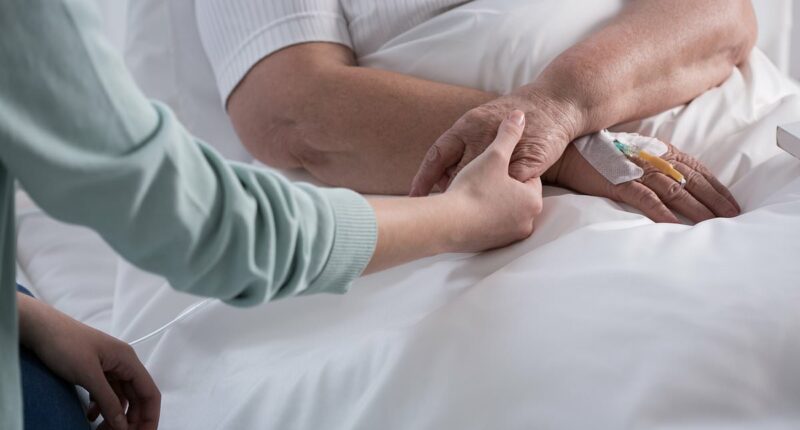Share this @internewscast.com
A hospice physician specializing in the care of those nearing the end of life has shared insights on the physical changes that occur as death approaches.
Typically, death is identified when a person’s heart ceases to beat, breathing halts, and they lose consciousness permanently.
However, according to Dr. Sarah Holmes, the Chief Medical Officer at Marie Curie UK, certain signs appear in the days and hours leading up to death that suggest it is imminent.
“As the body begins to slow down, individuals tend to become more fatigued and sleep more frequently. Their intake of food and water decreases as the digestive system starts to shut down,” Dr. Holmes explained to Ladbible.
This period, often called the transition phase, involves patients requiring additional assistance with everyday activities. They may also find it challenging to engage in conversations due to increasing fatigue.
For patients battling degenerative diseases such as dementia or Parkinson’s, these changes might be less noticeable, as they resemble the symptoms of their existing conditions.
Due to a reduced appetite, it’s also not uncommon for patients to enter a state of ketosis, whereby the body burns fat for energy instead of glucose, resulting in significant weight loss.
All these symptoms will gradually worsen until a patient’s final moments—when their breathing will become irregular, their circulation slows, and their heartbeat slows to a halt.

Ms Homes said that while death is a natural process and not to be feared, patients who harbour unresolved emotions or unfinished business often find it harder to let go
In around a third of patients, this is when the ‘rally’ happens and they’ll experience a sudden burst of mental clarity before they die.
For a brief couple of minutes, hours, or sometimes days, patients will return to their ‘normal’ selves and may even start shows signs of recovery—though it is not fully understood why this happens.
For years studies have even shown that the human brain still functions normally for a very brief time after the heart stops.
Research has also revealed that the brain can still experience sporadic bursts of activity even after an hour without oxygen, during resuscitation.
Such discoveries have led to some medics calling for an overhaul of the standard practice that rules people should be declared dead after three-to-five minutes of oxygen deprivation to the brain, as these patients could still in theory be resuscitated.
The last thing that happens before we die is a very noticable change in breathing, called cheyne-stokes respiration.
A patient will take a series of rapid breaths followed by long periods of no breathing, as if they have already taken their final breath.
‘Eventually, the breathing and heartbeat stop, followed by the brain,’ Ms Holmes explained.
‘It’s usually a very peaceful process whereby, in most cases, people simply slip away.’
She added: ‘I often remind families that palliative care is about living, not dying. Dying itself is short. Just like birth, the act of leaving the world is as brief as coming into it.’
Whilst everyone faces death differently, with some fearing death because it is in our nature to survive, others will have accepted their fate, typically those who have had a ‘good innings’, the best way to prepare is to talk about it with your loved ones, Ms Holmes explained.
Several studies have even shown that the more we learn about and contemplate death, the less scared we are of experiencing it.
This can be particularly useful for people who are already dying, or are in the process of losing a loved one, Ms Holmes added.
‘One of the most important parts of end-of-life care is helping people and their families come to terms with it,’ she said.
‘Everyone is different in their journey to death but the role of palliative care is to manage symptoms and encourage people to make plans.
‘This way, when these things are taken care of, people can focus on living right until the very end—saying what they want to say, doing what matters to them.
‘It’s often harder when there are unresolved emotions or unfinished business. Some people are at peace; others still struggle to let it go.’
A hospice is a specialised service that cares for patients whose illness has been diagnosed as terminal.
Some hospice services are run in specialist facilities while others care for patients in their own home through regular visits, depending on a patient’s needs and wishes.
Patients may enter hospice care upon their diagnosis or may go in and out of it at different times over the course of their terminal illness depending on the exact nature of their condition.
In the UK such services are free, funded by the NHS or charities, however there have been repeated warnings the sector is facing funding problems.
Just a few months ago hospice representative group Hospice UK warned the sector faced a £60million deficit.















